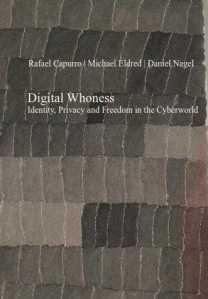 Rafael Capurro, Micharl Eldred, Daniel Nagel
Rafael Capurro, Micharl Eldred, Daniel Nagel
DIGITAL WHONESS: IDENTITY, PRIVACY AND FREEDOM IN THE CYBERWORLD
Heusenstamm, Germany, Ontos Verlag (Hardcover: 310 pp., 69€)
The first aim is to provide well-articulated concepts by thinking through elementary phenomena of today’s world, focusing on privacy and the digital, to clarify who we are in the cyberworld — hence a phenomenology of digital whoness. The second aim is to engage critically, hermeneutically with older and current literature on privacy, including in today’s emerging cyberworld. Phenomenological results include concepts of i) self-identity through interplay with the world, ii) personal privacy in contradistinction to the privacy of private property, iii) the cyberworld as an artificial, digital dimension in order to discuss iv) what freedom in the cyberworld can mean, whilst not neglecting v) intercultural aspects and vi) the EU context.
CONTENTS: 0) Introduction, 1) Phenomenology of whoness: identity, privacy, trust and freedom, 2) Digital Ontology, 3) Digital whoness in connection with privacy, publicity and freedom, 4) Intercultural aspects of digitally mediated whoness, privacy and freedom, 5) Cyberworld, privacy and the EU, 6) Brave new cyberworld.
An abridged version of this book was published as “IT and Privacy and Ethical Perspective – Digital Whoness: Identity, Privacy and Freedom in the Cyberworld” in Buchmann, J. (ed.): Internet Privacy – A Multidisciplinary Analysis, Berlin: Springer, 2012, pp. 63-141. Accessible here


